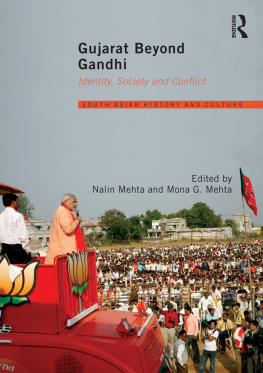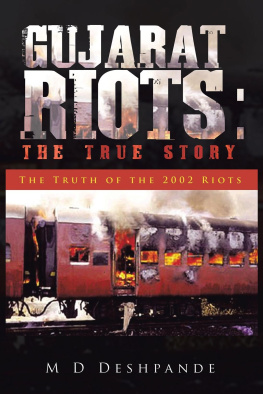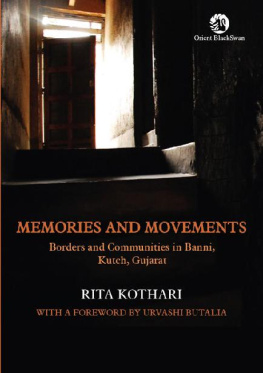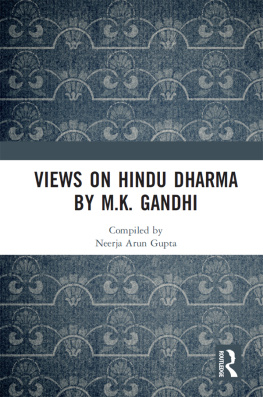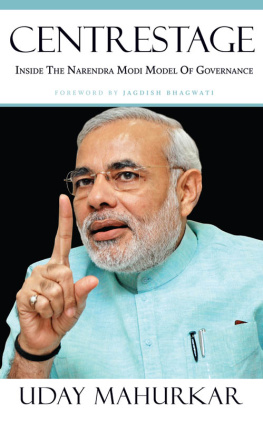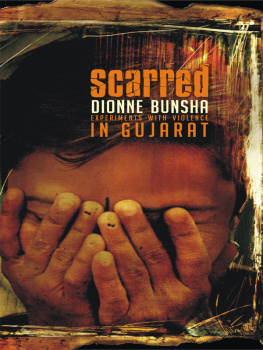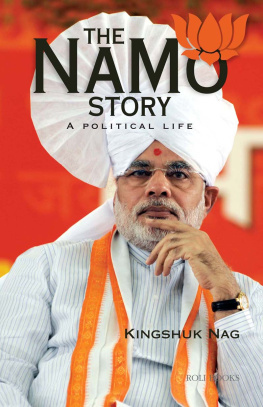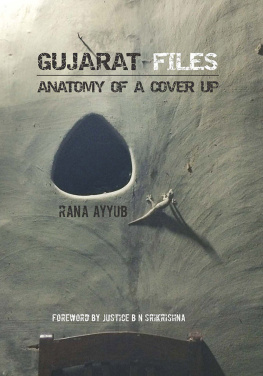Gujarat Beyond Gandhi
The birthplace of Mahatma Gandhi and the land that produced Mohammad Ali Jinnah, the founder of Pakistan, Gujarat has been at the centre-stage of South Asias political iconography for more than a century. As Gujarat, created as a separate state in 1960, celebrates its golden jubilee this collection of essays critically explores the many paradoxes and complexities of modernity and politics in the state. The contributors provide much-needed insights into the dominant impulses of identity formation, cultural change, political mobilisation, religious movements and modes of communication that define modern Gujarat.
This book touches upon a fascinating range of topics the identity debates at the heart of the idea of modern Gujarat; the trajectory of Gujarati politics from the 1950s to the present day; bootlegging, the practice of corruption and public power; vegetarianism and violence; urban planning and the enabling infrastructure of antagonism; global diasporas and provincial politics providing new insights into understanding the enigma of Gujarat. Going well beyond the boundaries of Gujarat and engaging with larger questions about democracy and diversity in India, this book will appeal to those interested in South Asian Studies, politics, sociology, history as well as the general reader.
This book was published as a special issue of South Asian History and Culture.
Nalin Mehta is Joint Editor of South Asian History and Culture (Routledge) and Honorary Fellow, Institute of South Asian Studies, National University Singapore. His books include the award-winning India on Television: How Satellite News Channels Changed the Way We Think and Act (Asian Publishing Award 2009) and most recently he has co-authored the best-selling Sellotape Legacy: Delhi and the Commonwealth Games. Formerly Deputy News Editor and anchor at Times Now, as a journalist he has covered pivotal events in Gujarat for nearly a decade, including the earthquake of 2001, the 2002 riots and assembly elections in 2002 and 2007. He writes a weekly column for Mumbai Mirror and its sister publications.
Mona G. Mehta is Assistant Professor of Politics at Scripps College in Claremont, California, where she teaches politics of South Asia and comparative politics. Her research examines the processes by which a functioning democracy and a vibrant civil society have paradoxically become implicated in producing exclusion and Hindu-Muslim conflict in Gujarat. She has a PhD from the University of Chicago where she has taught courses in social science theory and identity politics in South Asia.
South Asian History and Culture
David Washbrook - University of Cambridge, UK
Boria Majumdar - University of Central Lancashire, UK
Sharmistha Gooptu - South Asia Research Foundation, India
Nalin Mehta - La Trobe University, Melbourne
This series offers a forum that will provide an integrated perspective on the field at large. It brings together research on South Asia in the humanities and social sciences, and provides scholars with a platform covering, but not restricted to, their particular fields of interest and specialization. Such an approach is critical to any expanding field of study, for the development of more informed and broader perspectives, and of more overarching theoretical conceptions.
The series achieves a multidisciplinary forum for the study of South Asia under the aegis of established disciplines (e.g. history, politics, gender studies) combined with more recent fields (e.g. sport studies, sexuality studies). A focus is also to make available to a broader readership new research on film, media, photography, medicine and the environment, which have to date remained more specialized fields within South Asian studies.
A significant concern for the series is to focus across the whole of the region known as South Asia, and not simply on India, as most South Asia forums inevitably tend to do. We are most conscious of this gap in South Asian studies and work to bring into focus more scholarship on and from Pakistan, Bangladesh, Sri Lanka, Nepal and other parts of South Asia.
Health, Culture and Religion in South Asia
Critical Perspectives
Edited by Assa Doron and Alex Broom
Minority Nationalisms in South Asia
Edited by Tanweer Fazal
Gujarat Beyond Gandhi
Identity, Society and Conflict
Edited by Nalin Mehta and Mona Mehta
South Asian Transnationalisms
Cultural Exchange in the Twentieth Century
Edited by Babli Sinha
Religious Cultures in Early Modern India
New Perspectives
Edited by Rosalind O Hanlon and David Washbrook
First published 2011
by Routledge
2 Park Square, Milton Park, Abingdon, Oxon, OX14 4RN
Simultaneously published in the USA and Canada
by Routledge
711 Third Avenue, New York, NY 10017
Routledge is an imprint of the Taylor & Francis Group, an informa business
2011 Taylor & Francis
This book is a reproduction of South Asian History and Culture, vol. 1, issue 4. The Publisher requests to those authors who may be citing this book to state, also, the bibliographical details of the special issue on which the book was based.
All rights reserved. No part of this book may be reprinted or reproduced or utilised in any form or by any electronic, mechanical, or other means, now known or hereafter invented, including photocopying and recording, or in any information storage or retrieval system, without permission in writing from the publishers.
Trademark notice: Product or corporate names may be trademarks or registered trademarks, and are used only for identification and explanation without intent to infringe.
British Library Cataloguing in Publication Data
A catalogue record for this book is available from the British Library
ISBN13: 978-0-415-55612-5
Disclaimer
The publisher would like to make readers aware that the chapters in this book are referred to as articles as they had been in the special issue. The publisher accepts responsibility for any inconsistencies that may have arisen in the course of preparing this volume for print.
Anindita Chakrabarti received her doctoral degree from the Department of Sociology, Delhi University in 2007. She works in the area of sociology of religion and social movements. She is currently an assistant professor of sociology at the Department of Humanities and Social Sciences, Indian Institute of Technology, Kanpur.
Parvis Ghassem-Fachandi is an Assistant Professor in the Department of Anthropology at Rutgers University. He received a Magister in Ethnologie in 1998 at the Freie Universitt Berlin (Germany), and a PhD from Cornell University in Ithaca, NY (USA), in 2006. He taught at Princeton University in 2006 and held a postdoctoral fellowship at the Center for Religion and Media at New York University in 2007. He has conducted ethnographic field research in Gibraltar, the US, and India on topics including ritual, religion, violence, nationalism, identification, abjection, and affect. He is the editor of Violence: Ethnographic Encounters (Berg Press, 2009), Muslimische Heilige in Gujarat: Sufismus, Synkretismus, und Praxis im westlichen Indien (Editio Cortis Aquilae, 2008) as well as

